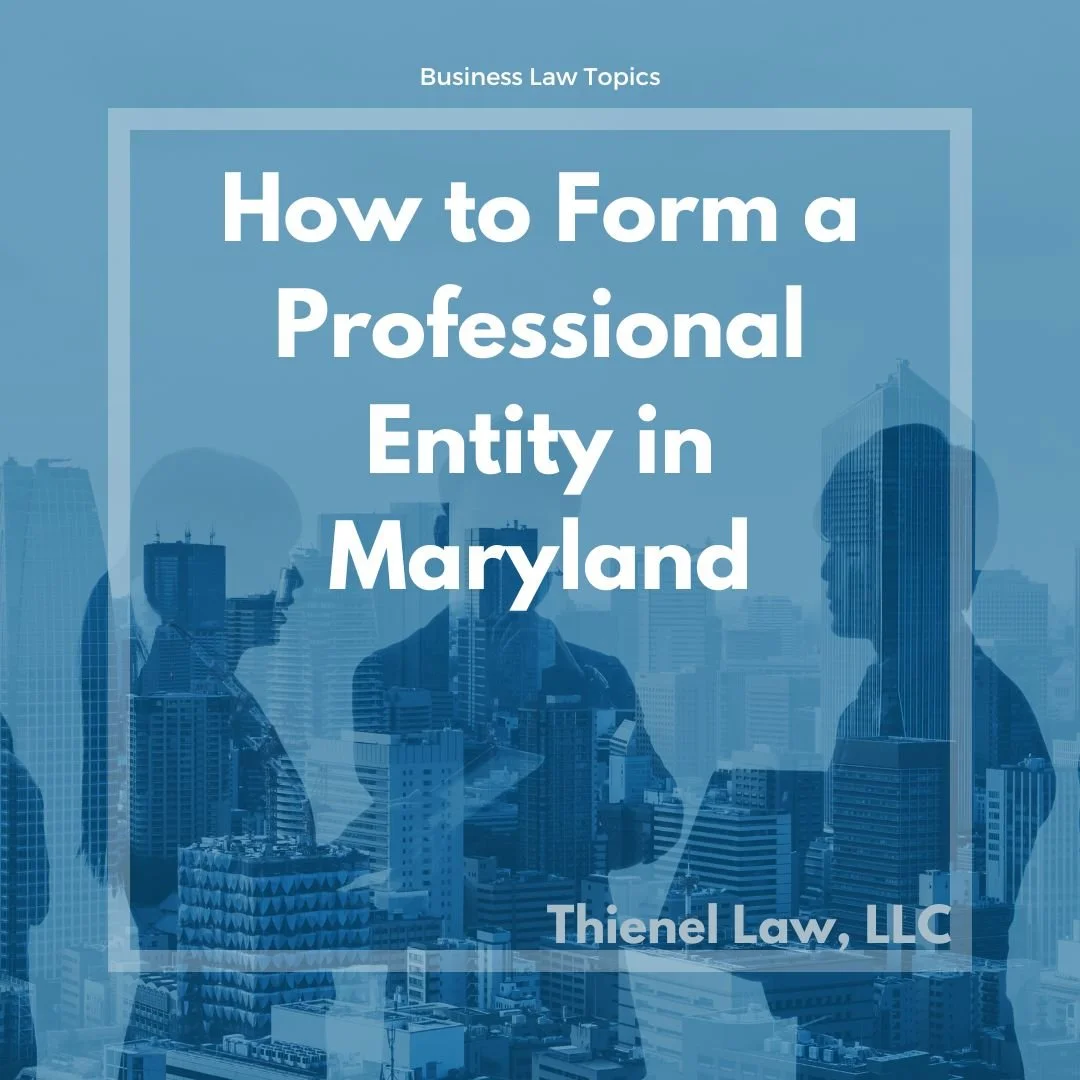How to Form a Professional Entity in Maryland
Licensed professionals can join together to form a business entity in Maryland. They may choose one of several business entities. Choosing the correct professional entity is crucial for protecting your business and personal interests. Before forming a professional entity in Maryland, you should seek legal advice from an experienced Maryland business attorney.
What Is a Maryland Professional Entity?
A professional entity is a group of licensed professionals organized into a legal entity to operate their business. For example, a professional entity could be a group of accountants, physicians, or lawyers. Each member of the professional entity must be licensed to practice the same profession in Maryland.
A professional entity can be a corporation or a limited liability company. Maryland law does not recognize a PLLC (professional limited liability company). However, professionals can organize as an LLC.
How Do You Form a Professional LLC in Maryland?
The first step is to verify that all members of the professional LLC are licensed to practice the same profession. Next, check with the state licensing board to verify whether you need approval to form a professional entity.
Choose a name for the professional entity. State law requires that the company name includes one of these terms:
L.L.C.
LLC
Limited Liability Company
Each LLC must have a registered agent. The registered agent is the person or entity authorized to accept legal documents for the business.
After choosing a name and registered agent, file the Articles of Organization with the State Department of Assessments and Taxation (SDAT). The filing fee begins at $100.
State law does not require a professional LLC to file or have an operating agreement. However, if you have an operating agreement, it is legally binding on all members. As with any business venture, it is wise to have an operating agreement to define the rights, responsibilities, and interests of the members or partners.
An operating agreement defines the rules for the professional entity. The agreement outlines how the members will share assets, earnings, and debts. It describes how the LLC is managed, operated, and controlled. The operating agreement can also define how members are added to the LLC and the procedure for a member to leave the professional entity.
How Do You Form a Professional Corporation in Maryland?
Another type of professional entity in Maryland is a professional corporation (PC). A PC is a group of licensed professionals who agree to form a business to offer their professional services to the public. Forming a PC begins with choosing a name. The name must have one of these terms:
Professional Corporation
P.C.
Professional Association
P.A.
You can reserve your name with the state for up to 30 days to let you complete and file the forms to create the professional corporation. It is a good idea to pick a web domain name and purchase it so it is not taken when you file to incorporate the business. Like professional LLCs, professional corporations must have a registered agent for service of process.
After choosing your name and registered agent, complete the Articles of Incorporation and file them with the State Department of Assessments and Taxation (SDAT). The filing fee begins at $120.
If you have not done so, you must establish a board of directors and adopt corporate bylaws. The bylaws govern the policies and procedures for operating the professional corporation.
Do We Need to Form a Professional LLC or a Professional Corporation?
The differences between a professional LLC and a professional corporation are similar to those between a regular LLC and a corporation. For example, a PLLC has members, but shareholders own a PC.
The PLLC is a pass-through entity meaning each member pays income taxes on their allocated share of the business profits. However, a PC pays corporate taxes on earnings, and the shareholders pay taxes on the dividends they receive. However, a PC can elect to be an S corporation to change the professional corporation into a pass-through tax entity. Furthermore, Maryland requires LLCs to file Personal Property returns and pay income taxes to income allocated to a nonresident member. Tax issues can become complicated for a professional entity.
Additionally, a PLLC does not protect members from all liability. The professional LLC potentially protects you from debts owed solely by the LLC, malpractice by other members of the LLC, and liability for injuries or harm unrelated to your malpractice or torts. A professional corporation may provide a higher level of personal protection. The tradeoff is that a PC has more formalities that must be maintained to retain a higher level of personal protection for shareholders.
Forming a PLLC or a PC in Maryland can be complex. A Maryland business attorney analyzes your group’s goals to determine which professional entity provides the structure your group needs. Contact Steve today to help form your professional entity in Maryland.


